If you’ve been studying with good TOEFL materials, you may already know that transition words are very important for the TOEFL. The truth is that they’re important for all communication, but they’re especially helpful for writing good essays, structuring answers, and analyzing text, and those three skills major parts of the TOEFL.
There are, of course, many different kinds of transition words. There are words that show cause and effect (e.g. “because”), those that simply continue a list (e.g. “and”), and others. One of the most important categories of transition words is contrast.
The most basic, most needed contrast word is “but.” There are many more, though, with many different specific uses and meanings. Let’s look at some of the less common contrast words you might see or hear on your TOEFL.
Albeit
This is one of my favorite transition words. Its usage is very close to the usage of “although”—the meaning is not so strange. But the form of the word is interesting. It comes from the very old phrase “all be it,” and that’s still how we pronounce “albeit.”
The structure of a sentence with “albeit” is important to note, too. Usually, there is no noun or subject after it. That’s because, in a way, “albeit” contains the word “it.” There’s already a noun inside the word. You can think of albeit as “although it is” or “although it was.”
So we could say “We worked hard, although we were very slow,” with the word “we” after “although,” but when using “albeit,” we would instead say “We worked hard, albeit very slowly.”
TOEFL example: The turn of the century was marked by a massive technological leap forward, albeit a time of great uncertainty.
Nonetheless / Nevertheless
These two words mean the same thing. They’re extremely close in meaning to the word “however.” The sentence or statement that is before “nonetheless” or “nevertheless” contradicts the statement that’s after, but the second statement is still true and isn’t changed by the first statement.
Keep in mind that both of these words, like “however,” are used to start a sentence, and a comma is placed after them.
TOEFL example: Van Gogh’s work was mostly unknown during his life. Nevertheless, his paintings are some of the most famous in the world, today.
Notwithstanding
“Notwithstanding” looks a lot like “nonetheless” and “nevertheless,” and the meaning is very similar, but the usage is a bit different. Instead of introducing a full sentence, it usually comes before a single noun phrase. In that sense, it is very similar to the word “despite.”
Interestingly, “notwithstanding” can also come after the noun. In fact, that structure is a bit more common. So you can say “notwithstanding the problems” or “the problems notwithstanding” to mean the same thing.
TOEFL example: The dark title of the book notwithstanding, it was actually an attempt at comedy—albeit not a very good one.
Meanwhile
There are a couple meanings of “meanwhile,” and most people know the meaning related to time before they know the meaning related to contrast. The word means, literally, that two things happen at the same time. But that can be used to show that it’s surprising that both things are true or both things are happening.
For example, I could say this, meaning only that the two things happened at the same time:
“My mother was out shopping. Meanwhile, I prepared her surprise birthday party.”
But I could also create a contrast like this:
“My father did nothing for my mother’s birthday. Meanwhile, I prepared her a surprise party.”
TOEFL example: The explosion of the Hindenburg was considered a great tragedy, but there were comparatively few deaths—only 36. The crash of the Titanic, meanwhile, killed over 1,500.






Leave a Reply